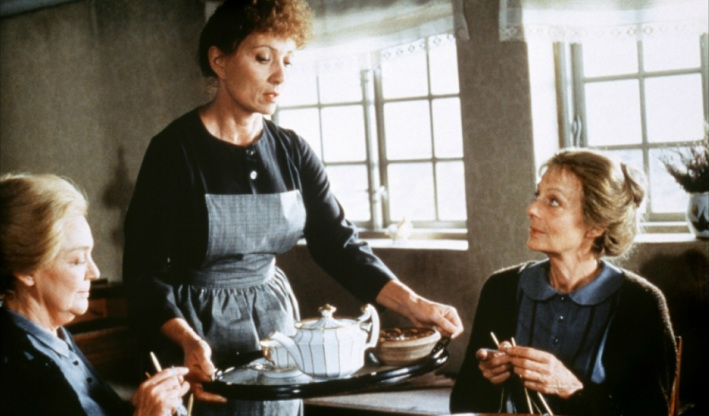- - -
As lush as it is minimalistic, Babette's Feast is a film that feeds the soul. It won the Academy Award for Best Foreign Language Film, the first Danish one to do so, in 1988, and was based on the short story by Karen Blixen (also the author of Out of Africa).
The film opens in a wild land of muted tones where the ocean is obviously essential to the life of this tiny village. You can nearly smell the salt air and drying fish. The two sisters around whom the story rotates are plainly dressed as they wordlessly deliver soups to elderly souls, themselves not young either. This is duty but not obligation -- it's just the way of things. We learn that the sisters -- Filippa and Martine -- are the daughters of a now-deceased minister whose followers are dwindling in number as the years progress. They happily manage the flock, though the audience gathers that despite their kind natures, settled beneath themselves in this sparse place. They are products of their culture -- reserved as only the Scandinavians can be -- and deeply pious. This is not a place for excess.
It is curious then, when Babette (Stéphane Audran), a French expatriate who is more refined than the town calls for, comes on screen, serving tea to the sisters and their father's congregation. What use does a modest fishing town on the coast of Jutland have for a maidservant? "It can only be explained," says the narrator, "through the hidden regions of the heart." For the next 25 minutes we leave Babette in the present to travel back 49 years.
Each sister, in her youth and beauty, was courted by a suitor -- Martine by a misguided though sweet Swedish officer, and Filippa by a sincere, boisterous opera singer. In heartbreaking fashion, each man is turned away by the girls out of duty to their father and perhaps out of fear. These decisions are foundational to the emotional arc of the story: they demonstrate how committed the sisters are to their faith and their little community, even when faced with fame (Filippa, who has an angelic singing voice) or family (Martine, with whom the officer wished for a simpler life). Years later, Babette is sent to the sisters by the opera singer to escape the French Revolution; he recommends her as a housekeeper and cook. Of course the sisters oblige, and Babette lives with them for the next 14 years.
It is a joy to watch Babette begin her time in the community as a silent observer, mouthing foreign words and learning bland recipes or currency exchange while she adapts to the modest customs of the Danish. Displaying wit, charm, and ingenuity, she wins over the townsfolk and holds her own among the local businessmen; she also saves the sisters money with her frugal methods.
Babette's one connection to her old life is a lottery ticket that someone renews for her annually. Martine and Filippa are shocked to learn, after many years, that she has won -- 10,000 francs. She plans to return to Paris. Babette's announcement coincides with the long-awaited 100th birthday of the minister which the sisters wish to celebrate with a "modest supper, followed by a cup of coffee." Babette asks to be allowed to prepare the dinner instead, a "real French meal," as a token of her thanks. The sisters agree despite discomfort at the idea of such fineries (not entirely sure it doesn't constitute devilry), especially in celebration of their father; they call together the congregation and solemnly promise together to eat the meal out of respect for Babette, but to neither enjoy nor speak of it.
The last act of the film is full of unabashed, sumptuous shots of Babette escorting crates of food (much to the town's disruption), preparing it, and serving the meal in high style. Of course, the guests have no concept of their good fortune; and in one of the most restrained jokes committed to film, the entire table of diners fights to maintain stoic displeasure while they consume the best meal of their lives. Babette is skilled in the kitchen, and the audience sees her take command as if directing a symphony.
Though outwardly modest, this film is more emotionally genuine than most dramas. The climax is touching, and the entire story manages to depict each culture and person -- no matter how strange in relation to one another -- with respect. In the hands of a lesser director, the story would have been saccharine and heavy-handed. Instead, it communicates the best of what people can offer, even when they are individually flawed.


 RSS Feed
RSS Feed
